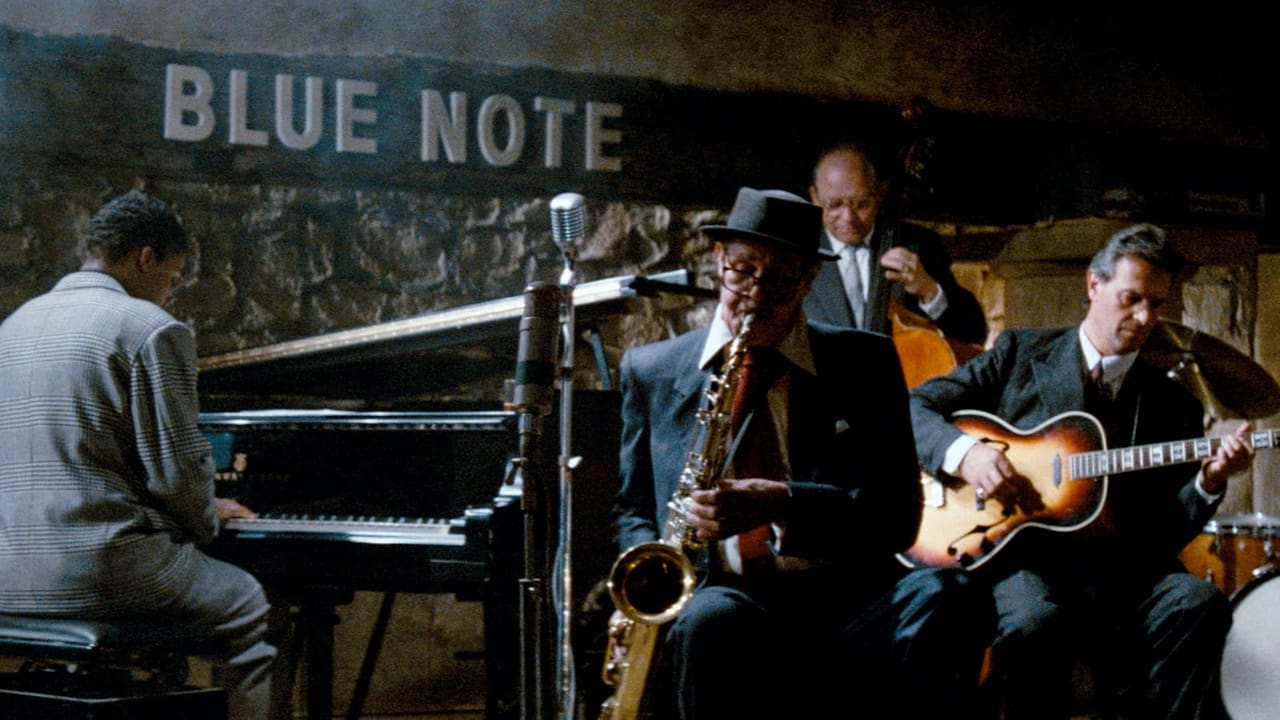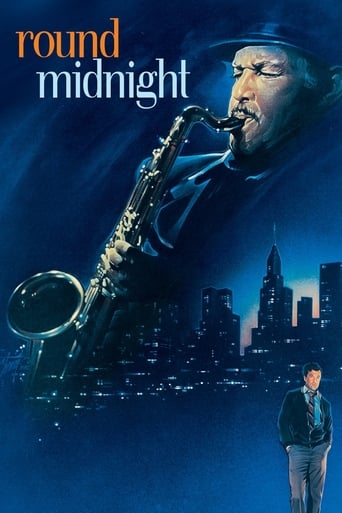

Filmmaker/jazz buff Bertrand Tavernier's story of an aging, alcoholic tenor sax man living in Paris works best when sticking to the music and steering clear of the jazz lover's anguished adulation. At the heart of the film is a compelling amateur performance by Dexter Gordon, a jazzman himself just doing what comes natural, playing a musician grown "tired of everything except the music." Gordon's ragged, melancholy voice and lazy mannerisms hold the episodic non-plot together, providing a measure of quiet relief from the histrionic outbursts of his number-one fan François Cluzet, who is forced to pour his heart and soul into lines like, "He is a great musician! A genius!" and, "Your music changed my life!" It may not hold much interest to anyone not already inclined toward the music of Bud Powell and Lester Young (to whom the film is dedicated), but die-hard aficionados will (like François) find it a small slice of jazz heaven.
... View More"'Round Midnight" the song is a jazz standard by pianist Thelonious Monk. It is thought that Monk originally composed the song sometime between 1940 and 1941. However, Harry Colomby claims that Monk may have written an early version around 1936 (at the age of 19) with the appropriate title of "Grand Finale". "'Round Midnight" is the most-recorded jazz standard composed by a jazz musician. On the website allmusic.com it is listed on over 1000 separate albums.The FILM 'Round Midnight, was inspired by the lives of real-life jazzmen Bud Powell and Lester Young, combined into the character of tenor sax player Dale Turner, played by Dexter Gordon. The character of Francis Borler, a Parisian man obsessed with Turner's music who befriends him, is based on Francis Paudras who wrote Dance of the infidels: a portrait of Bud Powell about his friendship with Powell.It is director Bertrand Tavernier's audio-visual lament for the impending death of jazz.In 'Round Midnight, real-life jazz legend Dexter Gordon brilliantly portrays Dale Turner, a musician slowly losing the battle with alcoholism, estranged from his family, and hanging on by a thread in the 1950's New York jazz world. Turner gets an offer to play in Paris, where, like many other black American musicians at the time, he enjoys a respect for his humanity that is not based upon the color of his skin. There he meets an admirer who befriends him and tries to save Turner from himself. Although for Dale the damage is already done, his poignant relationship with the man and his young daughter re-kindles his spirit and his music as the end draws near.Considered one of the world's greatest tenor saxophonists, jazz legend Dexter Gordon (1923-1990) was once quoted as saying, "Jazz to me is a living music. It's a music that since its beginning has expressed the feelings, the dreams, hopes, of the people." Gordon Dexter's height was 6 feet 6 inches and his nickname was Long Tall Dexter and because he was so large, so was his sound. He was known for his tendency to play behind the beat. Growing up, his doctor-father introduced him to his patients Duke Ellington & Lionel Hampton. Dexter joined Lionel Hampton's band in 1940 and then went on to play for Louis Armstrong, Fletcher Henderson, Billy Eckstine and Lester Young. During the late 1950s he spent time in and out of jail and in the early 1960s recorded some landmark albums for Blue Note Records before moving to Paris for 15 years. Gordon found Europe in the 1960s a much easier place to live, saying that he experienced less racism and greater respect for jazz musicians. Upon his return to the states in the 1970's he was rediscovered and claimed a genius. Near the end of his life he turned actor and made the film ROUND MIDNIGHT that captured some of the similarities of his life story. He was Oscar nominated for the role. Gordon died of kidney failure on April 25, 1990, at age 67. He was voted musician of the year by Down Beat magazine in 1978 and 1980, and in the latter year was inducted into Down Beat's Jazz Hall of Fame.Back in 1986 I managed a small art theater in Dayton, Ohio and we played this film, ROUND MIDNIGHT. That's when I first discovered this amazing slice of life film that took me to a world I had only heard of. And this too is what film preservation is about, sharing the past of others So sit back and enjoy this tribute to a by gone music, film and musician in ROUND MIDNIGHT!
... View MoreI am not a great fan of jazz, particularly not the Herbie Hancock kind where it is all jerky or the kind where there is no discernible melody, but the jazz in this film is pretty good on the whole. The musical highlight for me was How Long has this been Going On?What I really liked about the film was the unhurried pace. There was not really a plot at all, the only story being that the lead character went to Paris, stayed there for a while and befriended a fan and his daughter, and then went home again. It is such a relief to see a film like this -- they are few and very far between-- where you can watch each scene without wondering what specific piece of information you are supposed to absorb before you move on to the next scene. And the absence of a plot does not mean that the film had nothing to say. On the contrary, it was a film about friendship, specifically the friendship between Dale and Francis, and it was outstanding in its observation of their relationship.It's a truly lovely, meandering, thought-provoking and ultimately very moving portrayal of a part of life.
... View MoreThis movie should have been a jazz documentary. The music is excellent but the acting and the script are disappointing. Overlong, unnecessary characters (Francis' daughter, parents). Buy the soundtrack and listen to it but you might skip this movie.
... View More